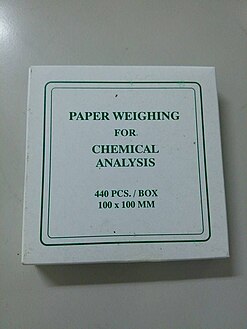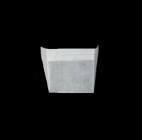Weighing paper: Difference between revisions
m →Types |
change media |
||
| Line 12: | Line 12: | ||
==Uses== |
==Uses== |
||
| ⚫ | |||
Weighing paper can be folded into different shape depending on its uses. |
Weighing paper can be folded into different shape depending on its uses. |
||
#Origami pouch: [[Origami]] pouch is a pocket-like shaped weighing paper that can be usually used for handling powdery, slippery samples. |
#Origami pouch: [[Origami]] pouch is a pocket-like shaped weighing paper that can be usually used for handling powdery, slippery samples. |
||
# Weighing boat: |
# Weighing boat: Weighing boat is a box-like folded weighing paper that can be usually used for handling solid, gunky samples. |
||
| ⚫ | |||
== Types == |
== Types == |
||
| Line 34: | Line 34: | ||
== Sizes == |
== Sizes == |
||
[[File:Weighing boat folded.jpg|thumb|folded weighing boat]] |
|||
The weighing paper is provided in different sizes : 6in by 6in, 4in by 4in, and 3in by 3in.<ref>{{Cite web |
The weighing paper is provided in different sizes : 6in by 6in, 4in by 4in, and 3in by 3in.<ref>{{Cite web |
||
| url = http://www.sigmaaldrich.com/catalog/product/aldrich/z134120?lang=en®ion=TH |
| url = http://www.sigmaaldrich.com/catalog/product/aldrich/z134120?lang=en®ion=TH |
||
Revision as of 14:53, 16 March 2016

Weighing paper is often used when weighing a solid, powdery substances on an analytical balance. By preventing the substance from being gunked up, it increases the precision of the measurement.[1][2]
Production

The weighing paper is usually made through the process called calendering. First, a chemically manufactured paper pulp fiber is broken down and squeezed into the mold where it will dry into the sheet. Then, this sheet will be rolled down by hot roller. As a result, the pulp fiber will be flat and in the same direction. This process is called calendaring. To make the paper very smooth and moist-resistant, it goes through the process repetitively, called super-calendering.[3]
Uses
Weighing paper can be folded into different shape depending on its uses.
- Origami pouch: Origami pouch is a pocket-like shaped weighing paper that can be usually used for handling powdery, slippery samples.
- Weighing boat: Weighing boat is a box-like folded weighing paper that can be usually used for handling solid, gunky samples.

Types
- Low-nitrogen weighing paper: Low-nitrogen weighing paper is the most common type of weighing paper that is used for analytical balances in the labs. The smooth texture prevents gunking up and absorption of samples on the paper.[4]
- Sulfur-free weighing paper[5] : Sulfur-free weighing paper is usually used for weighing food materials. It is made up bleached glassine pulp and paper. As a result, it prevents the reaction of sample with other organic solvents such as alcohol, or acetone.
Sizes

The weighing paper is provided in different sizes : 6in by 6in, 4in by 4in, and 3in by 3in.[6]
See also
References
- ^ "Whatman weighing boats and paper". Sigmaaldrich. Sigmaaldrich. Retrieved 5 February 2016.
- ^ "Weighing paper, 4"x4", 500 sheets". Hometrainingtool. Hometrainingtool. Retrieved 5 February 2016.
- ^ "What is Glassine paper?". www.innovateus.net. Retrieved 2016-02-25.
- ^ "Fisherbrand Low-Nitrogen Weighing Paper:Balances, Scales and Weighing:Weighing". www.fishersci.com. Retrieved 2016-02-24.
- ^ "Raylabcon Weighing Paper Weighing paper:Balances, Scales and Weighing". www.fishersci.com. Retrieved 2016-02-24.
- ^ "Whatman® weighing boats and paper B-2 Sheets, 4 x 4 inch, 500/pk | Sigma-Aldrich". www.sigmaaldrich.com. Retrieved 2016-02-25.

